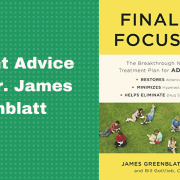Dr. Dean on Treating Inhalant Allergies Including Mold
Carolyn Dean, MD, ND
 Carolyn Dean is a medical doctor and naturopath. The “Doctor of the Future®,” she has authored and co-authored over 35 books including The Magnesium Miracle, IBS for Dummies, Hormone Balance, Death by Modern Medicine, and 110 Kindle books.
Carolyn Dean is a medical doctor and naturopath. The “Doctor of the Future®,” she has authored and co-authored over 35 books including The Magnesium Miracle, IBS for Dummies, Hormone Balance, Death by Modern Medicine, and 110 Kindle books.
Dr. Dean: We may be at the end of ragweed season, but mold season is going to be a huge problem for people in the flooded states of North and South Carolina.
Here’s part of my allergies section in my Future Health Now Encycopedia:
Diet
Avoid sugar, gluten and dairy, all of which are known to be common food allergens that increase mucus production, irritate mucus membranes and stimulate yeast overgrowth. Therefore, during allergy season, it is helpful to cut back on these mucus-producing foods. By doing so, you cut down the irritation in your mucus membranes and are therefore less susceptible to inhaled pollens and other irritants.
Yeast
As you will read in my book ReSet The Yeast Connection, yeast irritates nasal passages, sinuses, and the gastrointestinal tract, causing micropunctures that allow pollens and toxins to be absorbed thus setting off allergic reactions and sensitivities. The proper treatment of yeast often lessens or eliminates hay fever attacks.
Suggested supplements
- ReMag, a 100% absorbed, bioavailable, non-laxative magnesium. Dosage: ½-1 tsp twice per day. This mineral drives 700-800 enzyme systems and is responsible for the production of energy in the body.
- Vitamin C complex: Choose a food-based organic product. Dosage: 250mg twice per day.
- Antronex is a very specific product made by the company Standard Process. Antronex contains a bovine liver fat extract called Yakriton, which helps the liver dispose of excess histamine.
- ReMyte, a 100% bioavailable multiple mineral, which contains 12 complementary minerals. Dosage: ½ tsp three times per day.
- Blue Ice Royal: Fermented Cod Liver Oil and Butter Oil provide balanced doses of Essential Fatty Acids, Vitamin D, Vitamin A, and Vitamin K2. Dosage: 1 capsule twice per day or ½ tsp per day.
- ReAline: Contains several methylated and food-based B vitamins along with L-methionine and L-taurine from natural sources. It is a safe, natural detoxifier that assists any condition. Dosage: 1 capsule twice per day.
Prevention
You may find that you react to substances and chemicals in your environment all year round. Women seem to be more sensitive to chemicals probably because they do most of the house cleaning and are therefore more exposed to harsh cleaning products, dust and mold.
First, investigate the household products and pesticide sprays used in and around your home and try to eliminate as many toxic chemicals as you can. There are many nontoxic products available; for example, borax is an all-purpose cleaner available in most grocery stores. It’s very safe and gentle enough to be used as an eyewash and vaginal douche (pharmaceutical grade).
For indoor allergens such as dust, mites, and mold, you must keep the air dry and clean with air filters and dehumidifiers. Make sure mold doesn’t grow in these appliances; mold spores can cause widespread symptoms in susceptible people.
If you feel worse in your home – look for hidden mold. Mold in bathrooms and basements is usually cleaned away with bleach, but the chlorine in bleach is unsafe to breathe. Safer methods include distilled white vinegar, which can be poured into a spray bottle and directed at the mold. Another is grapefruit seed extract (that can also be used to soak vegetables to kill parasites).Twenty drops in 2 cups of water in a spray bottle will also kill mold.
Tea tree oil is a very strong-smelling essential oil that is a powerful mold killer. Put one or two teaspoons in 2 cups of water, shake, and spray. Zeolite clay powder can also be spread on a moldy surface to kill the mold.
There are vegetable-enzyme cleaners on the market that also remove mold. If you do use Clorox bleach for bathroom mold, apply a diluted amount and do not inhale the fumes; quickly leave the bathroom and allow it to air out.
Dust mites, nasty looking, microscopic insects that find flakes of our shed skin tasty, are the most common inhaled allergens. Inhaled by babies, the bodies of mites can cause eczema and asthma. Prevent problems by vacuuming your mattress, cover it with safe plastic, wash your pillows and bedclothes frequently and use tile or hardwood instead of carpet on your floors.
Occasionally after a bad cold with nasal congestion, you can develop hay fever or dust allergies because your mucous membranes become very sensitive. If this happens, have someone else clean your home thoroughly or use a cotton mask, because cleaning and dusting itself can lead to an allergy attack.
Pet hair, fur, dander, skin oils and secretions can also create an allergy problem. They should at the very least be isolated from your sleeping space. A veterinarian friend warned me that fleabites can create infections and circulation problems leading to gangrene in diabetics when bites are sustained around the ankles. Animals should be kept out of the house and routinely treated for fleas.
Different substances in your work environment can produce “sick building syndrome.” This is a real condition that began to manifest itself when we tried to make our office buildings airtight and heat controlled. The fumes from hundreds of chemicals, including formaldehyde, paint, ink, copy machine chemicals, plastics, and pesticides overcome a sensitive person and produce a considerable amount of disability.
The dramatic increase in children’s asthma in recent years could be a result of chemical exposure to paint and harsh cleaning products in school. One of our greatest tasks in the twenty-first century is to demand efficient guidelines from both industry and government to clean up our environment.
Medical allergy shots have not, in my experience, been very helpful for most people. I commonly hear people say, “Well, I’ve been on allergy shots for several years now and I think they’re helping.” If they don’t help within a few months, they probably never will.
Carolyn Dean is a medical doctor and naturopath. The “Doctor of the Future®,” she has authored and co-authored over 35 books including The Magnesium Miracle, IBS for Dummies, Hormone Balance, Death by Modern Medicine, and 110 Kindle books. This article is excerpted from her informational website.
Learn about magnesium and more, by subscribing to Dr. Dean’s health tips by email. You can subscribe here.








